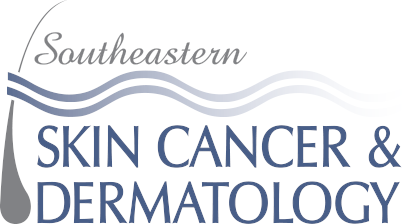Topical & Medical Skin Cancer Management
Home » Surgical & Mohs » Topical & Medical Skin Cancer Management
Just because we are skin cancer surgery experts does not mean that is our only tool. We tailor the treatment to your specific needs to provide the optimal outcome.
*some content below provided by the National Cancer Institute
There are different types of treatment for patients with nonmelanoma skin cancer and actinic keratosis.
Different types of treatment are available for patients with nonmelanoma skin cancer and actinic keratosis. Some treatments are standard (the currently used treatment), and some are being tested in clinical trials. A treatment clinical trial is a research study meant to help improve current treatments or obtain information on new treatments for patients with cancer. Typically, clinical trials involve more resistant or advanced cases. Most people will only need routine, in-office management.
At Southeastern Skin Cancer & Dermatology we are proud to have a fellowship-trained Mohs skin cancer surgeon, one of a limited number in the state of Alabama. So fortunately we do offer Mohs surgery, standard excisions (in-office, no sedation required), shave excisions/removals, electcrodessication and curettage (ED&C), cryosurgery and photodynamic therapy (PDT or “blue light”). Though we are trained in all of the procedural aspects and options, it does not mean that it would be the best option for you. When appropriate, we do offer other non-surgical options with topicals or other alternatives. We also refer to the excellent medical colleagues within the area when it is best for your specific case. Below are some other alternatives that we utilize.
Chemotherapy
Chemotherapy is a cancer treatment that uses drugs to stop the growth of cancer cells, either by killing the cells or by stopping them from dividing. When chemotherapy is taken by mouth or injected into a vein or muscle, the drugs enter the bloodstream and can reach cancer cells throughout the body (systemic chemotherapy). That would typically not be performed in a dermatologist’s office.
However, chemotherapy for nonmelanoma skin cancer and actinic keratosis is usually topical (applied to the skin in a cream or lotion). There are certain cancers that we directly inject with chemotherapy to achieve the most effect. The way the chemotherapy is given depends on the condition being treated.
Retinoids
Retinoids (drugs related to vitamin A) are sometimes used to treat squamous cell carcinoma of the skin. These can be either utilized topically or orally. They are not the Vitamin A taken from over the counter, so please DO NOT take excess doeses of this at home.
Photodynamic Therapy (PDT or “Blue Light”)
PDT is most often utilized for precancerous lesions on the body. However, in certain circumstances (since it has a lower rate of effectiveness), PDT can be utilized for cancer cells of the skin. Please see our page regarding photodynamic therapy (PDT / “blue light”) for more information.
Biologic Therapy
Biologic therapy is a treatment that uses the patient’s immune system to fight cancer. Substances made by the body or made in a laboratory are used to boost, direct, or restore the body’s natural defenses against cancer. This type of cancer treatment is also called biotherapy or immunotherapy.
Imiquimod and 5-fluorouracil are two topical agents used to treat skin cancer. Topical imiquimod and 5-fluorouracil therapy (creams applied to the skin) may be used to treat some small basal cell carcinomas or squamous cell carcinomas (and precancers).
Targeted Therapy
Targeted therapy is a type of treatment that uses drugs or other substances to attack cancer cells. Targeted therapies usually cause less harm to normal cells than chemotherapy or radiation therapy do. Targeted therapy with a signal transduction inhibitor is used to treat basal cell carcinoma. Signal transduction inhibitors block signals that are passed from one molecule to another inside a cell. Blocking these signals may kill cancer cells. Vismodegib and sonidegib are signal transduction inhibitors used to treat basal cell carcinoma. Imiquimod and 5-fluorouracil are two topical agents used to treat skin cancer. Topical imiquimod and 5-fluorouracil therapy (creams applied to the skin) may be used to treat some small basal cell carcinomas or squamous cell carcinomas (and precancers).
New types of treatment are being tested in clinical trials.
Information about clinical trials is available from the NCI website.
Basal cell carcinoma and squamous cell carcinoma have potential to recur (come back), usually within 5 years, or new tumors may form. Talk to your doctor about how often you should have your skin checked for signs of cancer.





